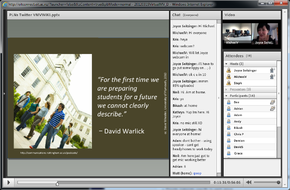VirtualMV/Digital Learning Technologies/Overview/21st C Learning
From WikiEducator
| Digital Learning Technologies | ||
|---|---|---|
| DLT Overview | 21st Century ( Learning | Teaching ) | Learning | Teaching | Digital Learning Technologies | Challenges | Future | |
Overview
Some think of 21st Century learning as just technology, however it encompasses all facets of student learning. Technology is an enabler or tool that assists. The 21st Century learner is a 20th C learner with add-ons (upsized!)
Trends
In Secondary Education
Features of 21 Century learning
- Student focus
- Critical thinking
- Global
- Social Communities (local, national and international)
- Multimedia (video - YouTube)
- Research community based, and can be done very quickly
- Loads of distractions and choices
- Mobile
- Instant
- High cognitive load - lots of information available
- Cut 'n paste mentality
- Huge mix of abilities (Digital gurus to digitally resistant )
- Lifelong learning
- Not necessarily interested in assessment. Happy to attend - apathetic
- Many used to mediocre success
- Multichannel (e.g. listens to music while studying/clears twitter/facebook)
- Some chat and listen
Also see What should students learn in the 21st century? (Fadel, 2012) [1]
Classes may be multi-generational
Cambiano, De Vore & Harvey (2001)[2] identify five generational groupings:
- Traditionalists: 1922 – 1943 (over 65)
- Baby Boomers: 1944 – 1964 (44 – 64)
- Generation X: 1965 – 1977 (31 – 43)
- Generation Y: 1978 – 1994 (14 – 30)
- Generation Z: 1995 - ? (Under 14)
- Generation F: 2003 -
- Liska (2005) and Boehle (2008) (in Corich, 2008)[3] have identified a number of characteristics and learning style preferences for each of the three groups. Their findings are summarised in the following Table.
| Generation | Characteristics | Learning Style |
| Baby_boomer (1944-64) |
Idealistic, Competitive ,Questioners of Authority, Tend to be optimistic, Like teamwork, Tend to be self-centered, Eager to put their own stamp on things |
|
| Generation_X (1965-77) |
Self-reliant, Resourceful, Distrustful of institutions, Highly adaptive, Skeptical, Desire balance, Enjoy informality, Are technically savvy, Respect is expected, Career not most important thing, Career hop to build skills, Want immediate feedback |
|
| Generation_Y (1978-94) |
Globally concerned, Realistic, Technological savvy, Sociable, Diverse, Desire to achieve, Environmentally conscious |
|
| Generation_F (Facebook) (2003 -) |
(Smith, Winston, 2011)
(Kendall, 2013)[4] |
|
 References
References
- ↑ Fadel,C. (2012) What should students learn in the 21st century?. Retrieved from http://oecdeducationtoday.blogspot.fr/2012/05/what-should-students-learn-in-21st.html?m=1
- ↑ Cambiano, R. L., De Vore, J,B., Harvey, R, L. 2001. Learning Style Preferences of the Cohorts: Generation X, Baby Boomers, and the Silent Generation. APAACE Journal of Adult Learning, v10 p31-39
- ↑ Corich, S. (2008) Developing strategies to deal with the multiple generational groupings within the tertiary classroom. pp. 201-207. Retrieved from http://www.citrenz.ac.nz/conferences/2008/201.pdf
- ↑ Kendall, P. (2013, March 13) Are we being rewired? The Dominion Post,p. A12.
|
virtualMV | Superquick wiki guide | Please give me some feedback |
VirtualMV/Digital Learning Technologies/Overview/21st C Learning. (2024). In WikiEducator/VirtualMV wiki. Retrieved April 20, 2024, from http:https://wikieducator.org/VirtualMV/Digital_Learning_Technologies/Overview/21st_C_Learning (zotero)
|
